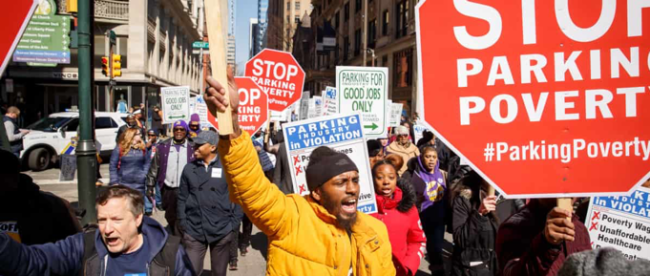Unions Should Not Back Down “Just-Cause” They are Afraid of Change

(Source)
Over the last few decades, union membership has continued to decline within the United States. As of 2018, union membership among all workers in the United States was 10.5%, a far cry from the 34.8% of workers who were represented by unions at their peak in 1954. While places like New York and California continue to demonstrate a strong union presence, other areas of the country have not. However, while union membership remains low, there is growing public support, as 62% of Americans approve of labor unions. At a time when union support is at a decade high, why is union membership so low?
A variety of factors have contributed to the decline of union membership. One factor contributing to this phenomenon is that as the job market continues to change, there are fewer manufacturing jobs and more service-based job opportunities in areas like retail, healthcare, and hospitality. These growing sectors are historically less likely to be unionized, compared to the manufacturing sector, which has always maintained a high union membership rate. Additionally, even when companies are creating new manufacturing jobs, the factories are typically built in non-union friendly states. Second, right-to-work states have contributed to the downfall of union membership. Right-to-work states have passed laws that allow non-union workers to enjoy the benefits of union membership without having to pay union dues. The policy creates little incentive for workers to contribute part of their hard-earned paycheck towards union representation. Workers effectively reap the benefits of a union, without having to join. Third, after the Supreme Court’s ruling in Janus v. AFSCME , public sector unions are no longer able to charge fees to non-union members. While many in the labor movement have said that the 2017 decision has not had a drastic effect on union membership, the majority’s opinion in Janus can hardly be viewed as a positive. These three developments all have contributed towards unions’ decline in membership, as well as a variety of other economic, social, and legislative factors.
However, even with declining membership, workers and unions have continued to make positive changes within the labor movement. The best example is the “Fight for $15” campaign, which launched in 2012. Unions soon joined the movement, helping to promote a $15 minimum wage, while pushing the narrative that workers have the right to unionize. Helping to raise the minimum wage is a positive for unions, since raising the minimum wage often triggers provisions in collective bargaining agreements that increase the hourly wage of working union members. For unions, a hike in the minimum wage benefits their members, which helps to increase membership. A campaign that began with workers fighting for a higher wage culminated in a nationwide initiative that has brought significant change. Seven states, several metropolitan cities, and even Fortune 500 companies like Amazon and Target have either passed legislation or instituted contractual policies to institute a $15 minimum wage. Additionally, The House passed a bill that would increase the federal minimum wage to $15 an hour. Although the proposal is unlikely to pass in the Senate, it serves as a testament to how a small movement became a national phenomenon. Improving the lives of workers everywhere, the Fight for $15 was a crucial moment, in which unions played a pivotal role and demonstrated their usefulness to millions of workers in the country. While there have been many other successes by unions in recent years, the Fight for $15 campaign is a shining example of the importance of unions supporting workers as they fight for a better life.
Today, unions face their next challenge as they must decide whether they will support just-cause legislation at a local level, which would require employers to have a valid reason for terminating employees in certain occupations. While there are currently many ideas being proposed to unions on how they could harness more bargaining power and increase their membership, working to support just-cause legislation is a simple tactic that would benefit unions. Scholars have been suggesting ideas such as sectoral bargaining, creating a union default system, and changing how union members are involved in the contract negotiation process. While all of these proposed methods may help increase union membership and enhance workers’ rights, they would require a major upheaval of today’s collective bargaining process. Fighting for just-cause legislation has already gained traction, has worker support, and would require unions to use the advocacy systems that they already have in place.
Briefly, it is essential to note that the United States has a history of employment-at-will, in which employers may fire employees on any grounds, so long as the termination is not based on a prohibited discriminatory reason. The idea of employment-at-will has historic roots in the legal landscape of American jurisprudence. The employee and the employer each have the freedom to enter a contract and end their relationship at any time. While unions have long negotiated just-cause clauses into collective bargaining agreements to ensure fair treatment of their members in the workplace, this new push for just-cause legislation would legally mandate that workers can only fire employees for a valid reason.
The Philadelphia City Council passed just-cause legislation in May 2019. The law requires that employers of parking workers must offer a valid reason for firing them. This legislation was supported by the local union, SEIU 32BJ, as parking workers in the city were complaining about being fired arbitrarily. New York City fast food workers have now turned their attention towards pushing for similar legislation so that they too can be protected from unfair firings. As workers in the fast food industry are fighting to secure their jobs, other cities like Seattle and Austin are closely monitoring the economic effects of the policy and are mulling over whether to enact similar legislation. While there is an uncertainty of whether the New York City just-cause legislation will become law, this new strategy to protect workers’ rights seem to be gaining momentum, as more cities consider laws protecting workers in certain industries from unfair firings. However, while just-cause legislation has focused on a select few industries so far, such as parking workers and fast-food workers, it could easily be expanded to cover larger industries or all employees.
While just-cause legislation helps to offer security to workers, such that they do not need to fear arbitrarily being fired from their job, unions are hesitant as to whether they should join the fight. One of the major selling points that unions use to recruit new members is their pitch that they will fight for just-cause language within a collective bargaining agreement. Should legislators continue to pass legislation ensuring just-cause terminations, unions argue that they would lose one of their most compelling arguments as to why workers should unionize. While local chapters of the unions are supportive of the just-cause legislation, like SEIU 32BJ in Philadelphia, the leadership of the national unions seem to be less supportive. In the 1980’s when just-cause legislation was suggested, unions were against it, seeing no tangible benefit that would help unions grow. Today’s political landscape is much different than the 1980’s. With the support of local unions and worker’s pressuring their unions to support such legislation, it may be possible that the leadership of the national unions decide they should join in on this worthy cause.
It should not take pressure from workers for national unions to support just-cause legislation. Unions may not see a clear benefit to supporting just-cause legislation like they did when supporting the Fight for $15 campaign, but unions must never forget their purpose, to support workers’ rights. Not every battle or movement should focus on whether union membership will grow, or financial contributions will rise. Instead unions must invest and support those causes that benefit their workers. While just-cause legislation may be a major selling point for recruiting new membership, just-cause legislation protects more workers and strengthens working conditions. Unions have always claimed to do what is best for workers and now is not the time to break away from that promise, even if they cannot see any clear benefit.
However, while union leadership may not see any clear tangible benefits to supporting a push for such legislation, they do not seem to be grasping the long-term effects. Workers who see unions fighting for their rights, supporting worker-friendly legislation, and joining workers on the ground in the fight to protect their jobs are certainty more likely to join a union. Suggesting that a union will ensure just-cause language in a contract is an attractive pitch, but so is saying that it was the unions that fought for all workers to be protected by just-cause language. Showing workers what unions are capable of, while arguing they can continue to fight for change, would lead to an increase in membership, not scare workers away. Unions offer higher wages, more bargaining power, a voice in the workplace and so much more. Fighting for all workers to be protected by just-cause legislation is not something that would harm unions, but something that would bolster union’s reputation for promoting workers’ rights.
As unions fight to increase their membership and to stay relevant in today’s modern workplace, now is not the time to back away from helping workers on a larger scale. Instead, just-cause legislation offers unions an opportunity to flex their power and show that they are more relevant than ever. Resisting change is rarely an opportunity for growth.
 Gregory Nelson is a J.D. candidate for the Class of 2021 at Cornell Law School. He graduated in 2018 from Cornell University with a B.S. in Industrial and Labor Relations. He is highly interested in the area of labor and employment law and plans to continue to perform research and eventually practice in this area of law.
Gregory Nelson is a J.D. candidate for the Class of 2021 at Cornell Law School. He graduated in 2018 from Cornell University with a B.S. in Industrial and Labor Relations. He is highly interested in the area of labor and employment law and plans to continue to perform research and eventually practice in this area of law.
Suggested Citation: Gregory Nelson, Unions Should Not Back Down “Just Cause” They are Afraid of Change, Cornell J.L. & Pub. Pol’y, The Issue Spotter, (Nov. 7, 2018), http://jlpp.org/blogzine/unions-should-not-back-down-just-cause-they-are-afraid-of-change/.
